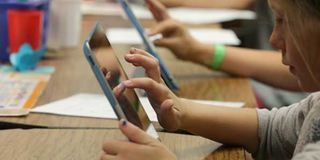Students to access texbooks with ease

What you need to know:
- Through Rachel, students can access textbooks, educational videos, and automated exercises for science, technology engineering and mathematics to complement and simplify the work done by teachers as well as making learning fun and entertaining.
Dar es Salaam. World Possible has introduced an offline digital library and platform known as Remote Areas and Community Hot-spot Education for Learning (R.A.C.H.E.L.) designed for schools’ learning and educational resources.
Through Rachel, students can access textbooks, educational videos, and automated exercises for science, technology engineering and mathematics to complement and simplify the work done by teachers as well as making learning fun and entertaining.
World Possible is an organization from US that has been registered in
Tanzania and has been funded for a two year program by Happel Foundation.
World Possible director Me Jackline Seni said the initiative was introduced since 2009 but the office was established in Tanzania at the beginning of this year.
She said this at the end of the week during the fourth innovation week 2018 exhibition that took place at the Commission for Science and Technology (Costech). The event was funded by Human Development Innovation Fund (HDIF) and UKaid.
According to her, they are currently working with 20 educational NGOs partners who purchase R.A.C.H.E.L for schools in the community they are working. “We have introduced the offline digital library (Rachel) in Kilolo (through Lyra in Africa), Iringa Urban (through the school
Fund), Karatu (through Powering Potential and Tablab), Kigoma (through Tanzania Development Trust), Musoma Moshi (through Asante Africa), Arusha (through E3empower Ltd), Dar es Salaam and Zanzibar (through IlikeSTEM4TZ) and the response has been good,” she said.
She said Rachel (the device) helps students access digital library without having to use internet and that the devices has a life time of about 10 years with minor maintenance cost such as batteries replacement. Adding to that, students can also perform different school projects through the information they obtain in the offline digital library because it’s quick, user friendly and materials can be accessed anywhere and anytime.




